Film Name:閃光少女 / Our Shining Days
[Spoiler Alert: This article contains spoilers.]
Since the beginning of the month, people have been constantly mentioning “Our Shining Days.” Everyone has been lavishing praise on it, with keywords like “anime-inspired,” “coming-of-age film,” and “traditional Chinese music and ancient style” successfully piquing my interest. As more people watched it, differing opinions finally began to surface—whether good or bad, you’d have to see it for yourself.
Having seen it myself, if judged purely as a theatrical release, the finished product feels like a mixed bag. But when you factor in other elements—like its vibrant yet measured portrayal of youth, the steadfast pursuit of love and dreams, and the preservation of cultural and artistic heritage—I’m more than willing to offer encouragement and support.
Since this piece focuses on the positives, let’s start with the flaws.
Throughout the film, what bothered me most was the pervasive atmosphere of antagonism and contempt. From the opening scenes to near the end, the hostility between Western and traditional Chinese music was palpable. Even minor moments, like the audience’s disdainful reactions before the “2.5-dimensional” band’s debut at a comic convention, were saturated with overt “we just don’t think much of you” attitudes… This isn’t “misunderstanding”; it’s sheer rudeness.
When the folk music group, led by the protagonists, is bullied to the brink of extinction by the Western music faction, both sides even arrange a showdown in front of the inspecting leader, Eason, staging a “musical duel.” Setting aside the fact that art knows no clear winner, what exactly was their criterion for victory? Who could make the loudest, longest noise?…
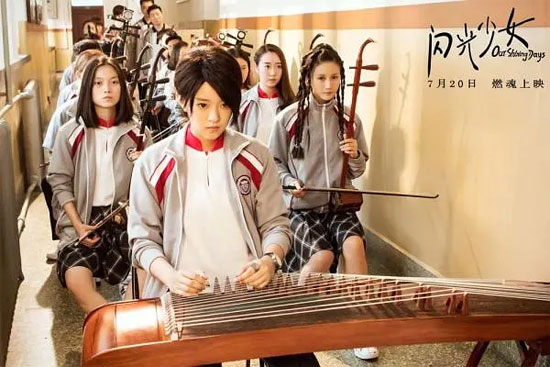
I understand the intent behind this approach—building tension before the payoff heightens the drama, and the reversal does deliver a satisfying sense of justice. After all, social hierarchies do exist in reality, and injustice and decline are part of life. But that’s not the whole picture. Unfortunately, the intended effect fell flat, resulting in some awkward scenes instead.
This issue extends to character dynamics and plot coherence. When “Nervous” confesses to the senior, she actively introduces Yangqin to him, only to fail in the end. Why turn a simple rejection into a conflict between piano and traditional Chinese instruments, where Western music looks down on folk music? A bit more nuance and refinement would have been welcome.
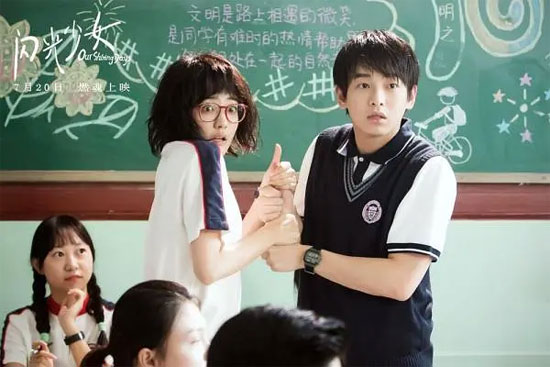
Of course, the true romantic subplot lies between Nerve and her male best friend “Oil Scum.” This was predictable from the start, and honestly, this part isn’t too problematic. It’s handled subtly and feels quite heartwarming… However, when we look at the bigger picture—from budding romance to campus life to youthful passion—the “youth” presented to us still feels filtered through rose-tinted glasses.
Alright, let’s move on to the strengths, though I’ll still touch on some shortcomings along the way.
The plot is straightforward: Second-year traditional music student “Nervous” (Chen Jing), who plays the yangqin, develops a crush on third-year Western music piano major Wang Wen. But her crush responds, “What’s a yangqin? I’m going abroad—don’t bother me.” Determined to prove herself, Nervous tries to form a traditional music band. Yet no one takes her seriously except “Oil Scum.” Left with no choice, she approaches the four residents of Dorm 502.
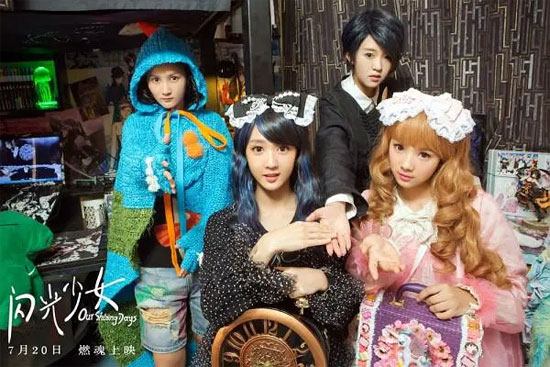
“Anime culture” is a key theme in Our Shining Days. The film’s initial character introductions feel slightly overdone: Sakura-chan, who can’t speak to strangers; Bei Bei-chan and Ta Ta-chan, who play games in lolita fashion; and Xiao Mai, a die-hard Black Butler fan who comes off as a cool tomboy… so stereotypical it borders on cliché.
But their uniqueness lies beneath the surface. Jingne lures them in with figurines, swiftly recruiting them into the fold. Thus begins the “2.5 bridge” connecting the anime world and reality, with Jingne and Youzha representing two distinct paths across it:
Nervous takes the path “from 3D to 2D.” She knew nothing about the anime world before, thinking it was just about watching anime, playing games, and buying dolls. As she delved deeper, she discovered a vast realm beyond her understanding—one that also demanded sincerity and effort.
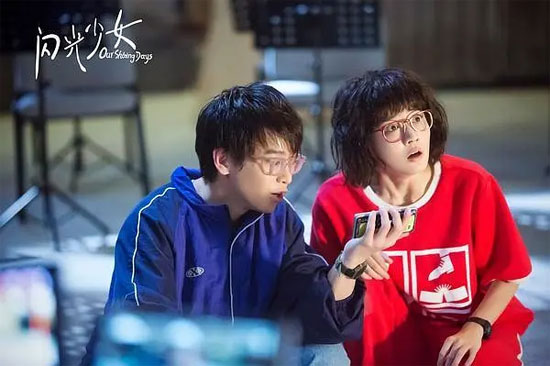
Oil Scum, however, was the path “from 2D to 3D.” He had always been a seasoned otaku, but had concealed himself due to the misguided perceptions of those around him. Upon discovering that Xiao Mai was none other than “Thousand Fingers”—the guzheng virtuoso from Bilibili—he immediately revealed his true self. Unfortunately, his appearance was too disheveled, and his comment “Flat chest, bad review” didn’t win him acceptance at first—though, it was quite “anime-style” how he transformed into a fresh-faced heartthrob after shedding his jacket and glasses.
Thus, the six gradually gelled into a 2.5-dimensional band. They faced the world’s mocking skepticism toward their music and grappled with internal conflicts. But the best solution remained singular: to strive to be the best versions of themselves.
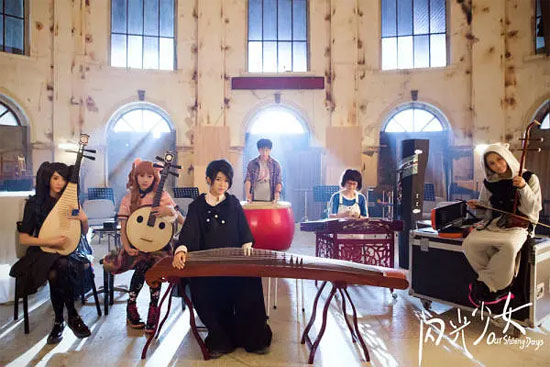
For instance, when they first performed at a comic convention, the audience had been wildly cheering for the girl group S.I.N.G. But upon learning the next act was traditional Chinese music, most of them left. Xiaomai and the others continued playing wholeheartedly for the handful of fans remaining below the stage. Their beautiful rendition of “Quan Yu Tian Xia” naturally drew more applause; Then there’s the scene where Jing and Xiaomai nearly split up, with Jing blurting out, “I only learned the yangqin because my mom made me!” Yet they ultimately rediscovered their passion and fought side by side with their comrades in the struggles that followed… Though these moments feel slightly contrived, the spirit they convey is undeniably uplifting.
Watching further, one realizes that “otaku culture” is merely one piece of the puzzle—their passion and perseverance for traditional folk music form the larger whole. This goes far beyond unconventional attire or learning a single ethnic instrument. They must master history, instruments, repertoires, and the evolution of various versions, enduring relentless practice and unwavering dedication despite countless unanswered questions.
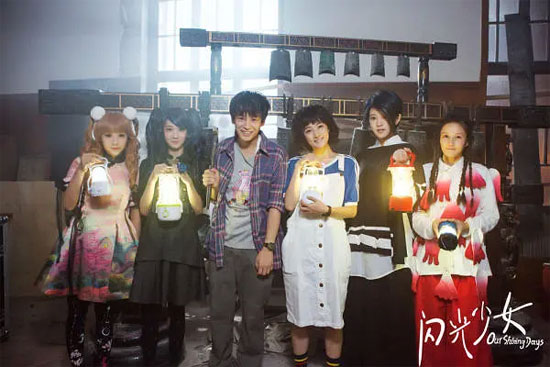
A telling detail: Before their promotional performance, the band realized they were missing a set of chime bells—instruments notoriously hard to come by. Just as they were about to give up, the security guard who’d secretly let them rehearse (and sing karaoke) at the venue stepped in. He dug out the massive, dust-covered bells that had been gathering dust in storage for twenty years— —When Youzha tremblingly struck the chime bells amid the audience’s rapt silence, the air brimmed with youth’s pilgrimage to weighty history and history’s smile upon passionate youth.
The ultimate climax, of course, was when the traditional music students—aided by their Western music peers—secretly entered the concert hall to deliver an “Easter egg” performance: By this point, all past grievances had been set aside. The traditional music students poured their hearts into performing a string puppet play, while the OTAKU cheer squad warmed up the crowd. Luo Tianyi danced across the stage, and later, Bebé and Táta even picked up guitars (a celebration of cultural coexistence and fusion)… Parents and children in the audience were delighted, erupting in thunderous applause.
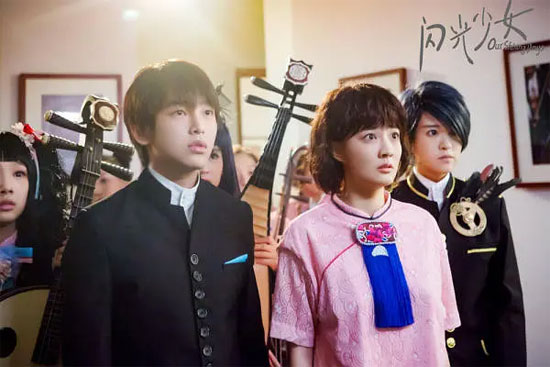
Ideals, beauty, effort, struggle, growth… Isn’t this what youth is all about?
What moved me even more, however, were the three pivotal moments of this ultimate performance: First, the security guard recited a passage from “The Sorrowful Expedition”: “Suppressing the great wind song, lingering in the arena of youth. Truly, the ancients spoke well: When birds are gone, the bow is put away.” This was followed by performances from traditional music students like Jingne, Youzha, and Xiaomai, culminating in the joy, curiosity, and hope radiating from the young audience. The shared experience of three generations—elderly, young, and children—seemed to symbolize the passing of the torch in traditional cultural arts.
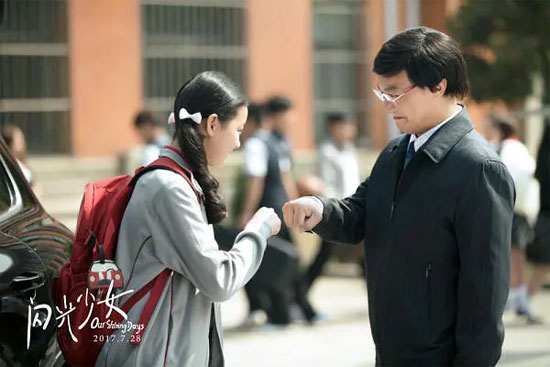
This theme becomes even more pronounced at the film’s conclusion. During his previous inspection, Eason Chan had ordered the removal of the iron gate surrounding the traditional music district. Now, he sends his own child to study music there. Simultaneously, more “anime-loving” students join the ranks as the new generation of juniors in the traditional music department…
Despite its flaws—clumsiness, naivety, and even some biases—Our Shining Days remains the best domestic youth film I’ve seen (though I rarely watch such films). Whether it’s anime culture or traditional folk music, these are merely vehicles for expressing aspirations. They could just as easily be basketball, video games, crafts, or books… What truly matters is the vibrant energy and positive spirit it radiates—this too is youth, and it should be everyone’s youth.
Please specify:Anime Phone Cases » Our Shining Days 閃光少女 2017 Film Review: There are no walls between dimensions; Those who take things seriously are the most beautiful.